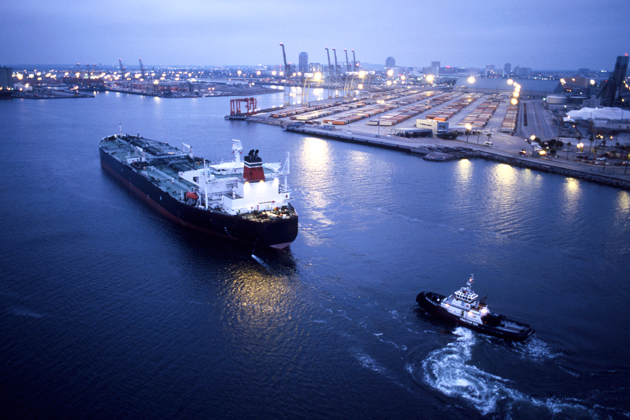- Move Against Wharf Landing Fees May Suffer Setback
The move by the Federal Government asking the Supreme Court to declare the Lagos State Wharf Landing Fees Law No. 5 of 2009 unconstitutional, and order the state to refund all the monies collected through the law may suffer setback.
This is because some of the council authorities around the ports have threatened to start the collection of the money, if the move by the state government fails.
The Wharf Landing Law was passed in 2009 when Babatunde Fashola, now the Minister for Power, Works and Housing, was the governor.
The law imposes levies, from N1,000 to N3,000, on consignments transported from Lagos sea ports to local government areas of the state.
Some residents of the local governments around Lagos sea ports, it was gathered, have written a letter to the Chairman, Lagos State Wharf Landing Fees Collecting Authority, Mr Joe Igbokwe, to assist them in collecting the money or allow officials of the local governments to do it.
Some of the residents and motorists operating in Apapa, Amuwo-Odofin, Ajeromi-Ifelodun, Surulere, Apapa-Igamu Local Council Development Area (LCDA) and environs said they would support any move by the state and local governments to attract development and restore the past glories of their areas.
They gave kudos to the state government for filling the pot-holes with broken bricks as a palliative measure pending the comprehensive rehabilitation of the roads in Apapa and Tincan Island.
One of the residents and chairman of the group, Mr Solomon Jayeola, said they would support the local government authorities in collecting the money if the court rules in favour of the petitioner.
It was gathered that associations at petroleum depots collect a huge amount of money from their members.
Findings revealed that the Petrol Tankers Drivers (PTD) collects N10,000; oil and gas suppliers collect N2,000; Engine Oil and Lubricants (ELD), Petroleum Station Workers (PSW) and Independent Marketers Branch (IMB) collect N2,000 and N1,000.
Also, the National Association of Road Transport Owners (NARTO), Marine Survey (MS) and Surface Tank Kerosene Distributors (SUTAKED) collect N2,500, N5,000 and N3,000.
“As residents of this area, we do not think N1,000 for a 40ft container and N500 for 20ft container is too much for the owners to pay to the government.
“Also, car drivers are asked to pay N300 while SUVs are to pay N500. But we have observed that car drivers are not willing and that is why we will support our local government in collecting the levies because it is a source of revenue generation for them as entrenched in the Constitution,” Jayeola said.
A motorist, Francis Solomon, also said Lagosians must support the state government in collecting the fees, and urged those affected to see it as part of their Corporate Social Responsibility (CSR)
“We want Lagosians to understand that the local governments around the ports are in dire need of the money during this period of recession. The local governments need your support and encouragement to look inwards to make life more comfortable for the residents.
“There is need for me to also draw the attention of the public to the inappropriateness of the solicitors to the AGF in this matter at the Supreme Court. The law firm is a counsel to Hermonfield Limited, a sub-contractor of the collecting agent appointed by the state government to collect wharf landing fees.”
Solomon alleged that the genuiness of the law firm was suspect as the case appeared to have been filed after the failure of an attempt to foist the sub-contractor on the state government.
Contacted, Igbokwe said the agency had issued 240 invoices to various companies and got only 81 responses in terms of payments.
The figure, he said, represents 34 per cent. He called on those concerned to pay up so that the rule of engagement will not degenerate to coercion.


 Billionaire Watch3 weeks ago
Billionaire Watch3 weeks ago
 Startups4 weeks ago
Startups4 weeks ago
 News4 weeks ago
News4 weeks ago
 News4 weeks ago
News4 weeks ago
 Bitcoin4 weeks ago
Bitcoin4 weeks ago
 Naira4 weeks ago
Naira4 weeks ago
 Forex3 weeks ago
Forex3 weeks ago
 Treasury Bills4 weeks ago
Treasury Bills4 weeks ago
























